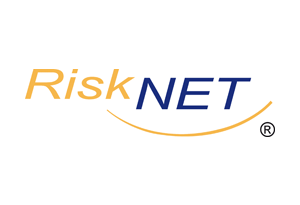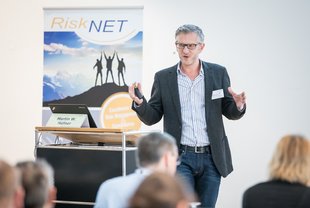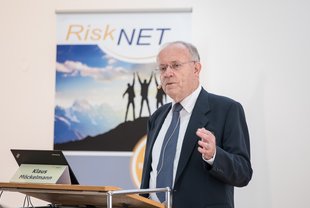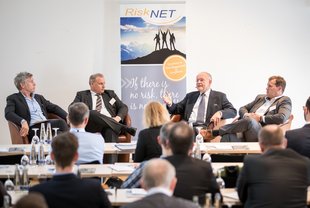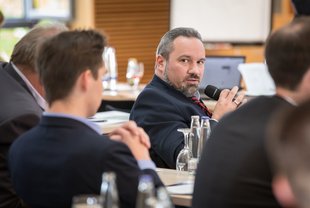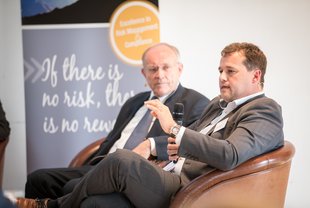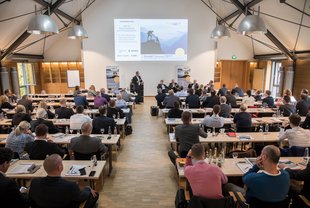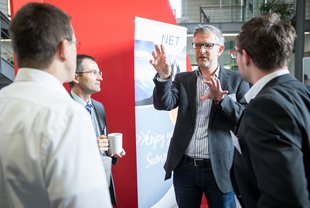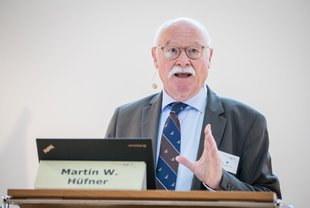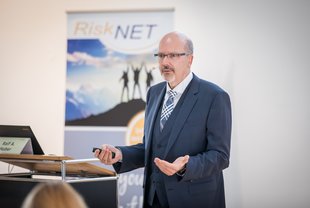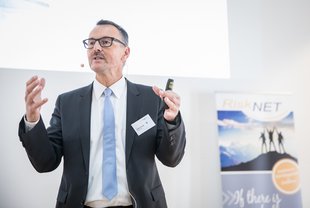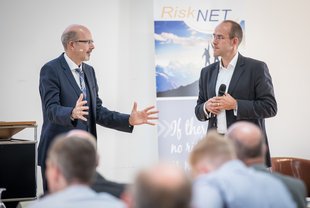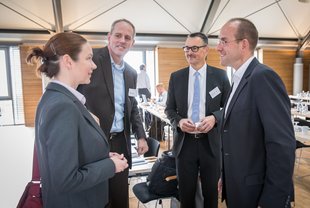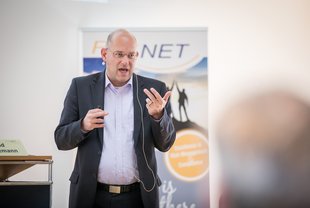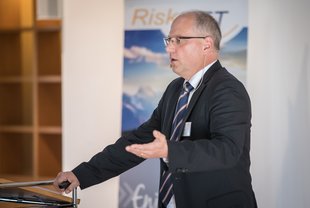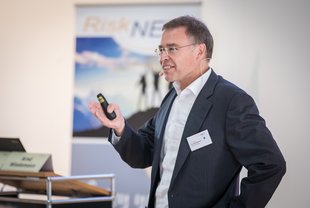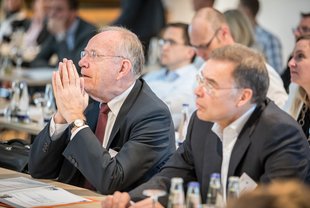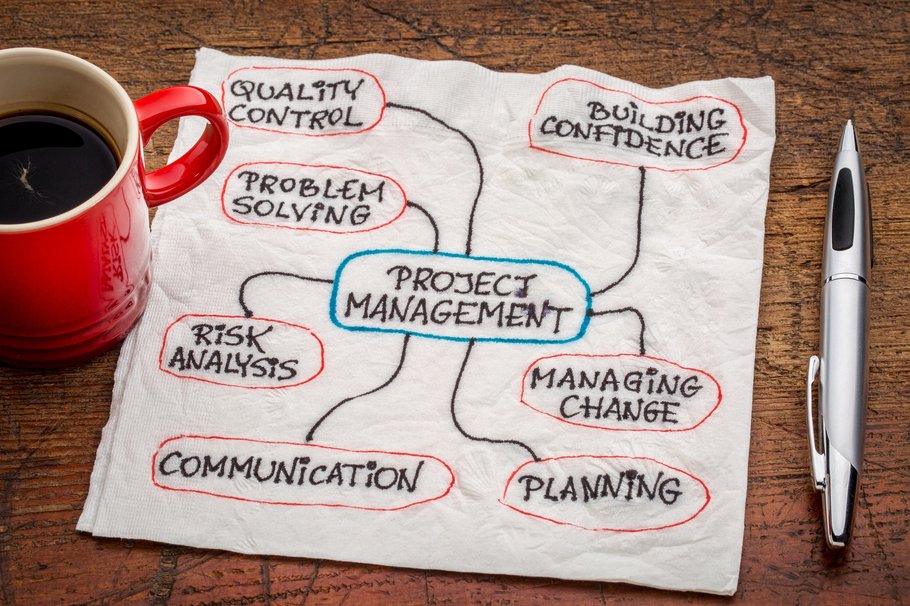Cyber hazards, sabotage, data theft, FinTechs, separatist movements, economic and geopolitical risks. The range of risks for all industries – and particularly for the financial sector – is wide and getting wider. In particu lar, the networking of the economy as a result of increasing digitalisation around the world is causing worry lines on the foreheads of many managers in the banking sector. The solution for all these risk factors is far from trivial and calls for new approaches and, above all, a professional toolkit of modern risk management methods. The RiskNET Summit 2017, held at the end of October at Schloss Hohenkammer near Munich, took a detailed look at the relevant tools, analytical techniques and methods.
On the threshold of the new millennium, many critics were calling for a "reintegration of the unchained economy at a global level", in the words of Heinrich Geiselberger, editor of the book "The Great Regression". He continues: "With the establishment of transnational institutions, politicians should be able to look for global solutions to global problems." But it is well known that things have turned out rather differently, as the financial and currency crisis emphatically demonstrated to us. And that's not all. It is difficult to find institutions on a global scale that are in a position to overcome the economic crisis. The EU is too reticent, the United Nations is too weak. Combined with the USA's retreat and that of the UK into unilateralism, this does not make global economic and trade policy any easier.
Economic policy caught between retreat and expansion
Günther Schmid, former Professor of International Politics and Security at the Munich/Berlin Civil Service College and previously geopolitics expert for the German intelligence service (BND), also sees the retreat of the USA as a key factor. At the RiskNET summit, he summarised the situation thus: "While the USA under Donald Trump is retreating from many areas of geopolitical events, the US administration is opening up new opportunities for China that were not there in the past." Essentially, China could create a new world order. China is pursuing a massive economic strategy. A billion Euro investment in the Silk Road project is just one example of this expansion policy. In addition, Schmid believes that China has a huge influence in South-east Europe. Martin Hüfner, Chief Economist at Assenagon Asset Management spoke on the topic of "The macroeconomic risk map" and outlined how transatlantic relationships are shifting. While Europe is taking a sceptical view of the USA and the current political situation, the mood within the country towards President Trump is becoming more positive. Speaking of positive, Chief Economist Hüfner thinks Europe is heading in the right direction with growth of over two percent, which is very significant for the continent. At the same time, unemployment is falling and Spain, Ireland and Portugal have been released from the austerity programme. Within the EU, new projects are being tackled, such as the European Monetary Fund and continuation of the banking union.
Blackout and hacker attacks
A look at the possible consequences of increasing digitalisation was provided by Herbert Saurugg, expert in preparation for the failure of critical infrastructures. According to his analysis, a Europe-wide power and infrastructure failure would have huge consequences for both public and private life. For example, cash machines would fail, people would no longer be able to make electronic payments and digital transactions on a global and national scale would no longer be possible. There would be a chain reaction with huge impacts on our tightly networked financial sector. Meanwhile, in his presentation on "Cyber shield: No digitalisation without security", Karl-Friedrich Thier from Telekom warned against cyber attacks. The damage they cause to the economy is huge, estimated in monetary terms at around 51 billion Euro per year for Germany alone. Worldwide losses are around 450 billion Euro according to estimates.
These are hefty figures, and the major driver of the increasing numbers of attacks is digitalisation, increasing networking, increasing dependency on the internet, outdated equipment and software, and a negligent approach to data security by employees. To protect ourselves, the Telekom expert recommends analyses, setting up an emergency management system, backups and awareness pro- grammes for our own staff.
From control to cultural issue
With all of these closely linked risks, the question arises: Do we have a comprehensive view of the risk universe? This was exactly the issue addressed by Arnd Wiedemann and Volker Stein in their presentation on "How risk governance strengthens risk management". The two Professors from the University of Siegen looked at the fields of risk management and corporate governance and concluded that there is a lack of bridges between the two worlds. As a result, they have developed a third way in the form of "risk governance". The focus is on the fundamental idea of proactive risk supervision from the inside out. The underlying philosophy involves establishing stakeholder-based risk management from a strategic perspective throughout the company. In Stein's words, every employee is a risk manager. Consequently, every employee can be involved in managing risks directly at their source. However, implementation has to be initiated by senior management – the "tone from the top" is crucial. This includes a clear role concept, rewarding individual behaviour and internal communication. As a result, risk governance is not a control issue, it is a cultural issue.
For Frank Romeike, organiser of the RiskNET Summit, there are three key issues that risk managers and decision-makers should be dealing with to ensure that they have the optimum toolkit as outlined above and, above all, they know how to use it. These include their own organisation, working methodology and risk culture.
The latter is important for stimulating enthusiasm for the issue of risk management. The vision for companies should be "Future enterprise risk management", in which risk management is well established, practised and part of life – across all areas of the company and all hierarchy levels.

